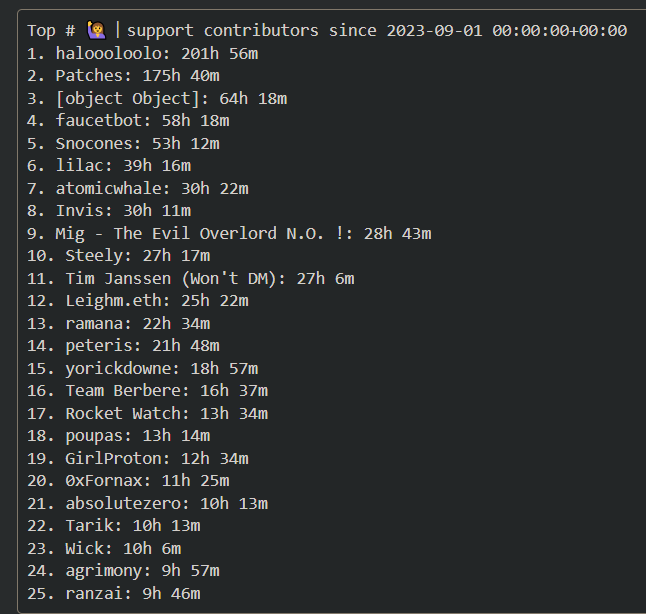I’ve got a more thorough post-mortem coming soon™, but one thing that came out of our first round of GMC discussions was a desire for…I don’t know whether to call it clarification or further action or something like that…from the community/pDAO in regards to how we fund “support”. By support I predominantly have in mind the support that people provide in the #support channel on Discord and similar things of that nature.
Inasmuch as the RP protocol is going to pay for support, it is going to come from the pDAO. My sense as a community member is this is a thing that most of us (myself included) think we should be (generously) reimbursing volunteer support personnel for. Support is different from many other potential line items (e.g. marketing, bizdev, research, coding) in that it is likely to recur in every single period and in roughly the same form. In that sense it is perhaps more similar to liquidity incentives (IMC) stuff than the kinds of grants the GMC was otherwise deciding on.
The GMC found it very difficult to decide how much to pay the support-related retrospective award requests this past cycle, including difficulty in deciding how much of our overall budget should go to support and how to weigh the contributions of the two people who submitted RAs (plus the potential other support folks who didn’t yet but may submit one in the future).
One thing that came out of GMC discussions is that it would be great if we could have a broader community discussion about how much we would like to spend of the pDAO’s overall inflation every period on “support” and whether that money should be coming entirely from the GMC’s budget, from GMC + reserves, from trimming IMC, etc. If the funds are coming entirely from the GMC, it would make the GMC’s life a lot easier if the committee knew roughly how much the community wanted spent on support payment every cycle.
The other thing that committee struggled with was determining how to allocate the support payments. In his RA request, Patches proposed number of messages in #support as a rough metric, and Object then based his request on his relative number of messages compared to Patches. That’s probably not the exact thing we want to be incentivizing in the future (e.g. pure message counts) but I think I can confidently speak for the GMC as a whole in saying that no one is interested in becoming the managers of #support, figuring out who deserves what share of the support allocation by monitoring that channel or other locations where support is provided. I think we are open to ideas on this front, whether that be the creation of a Support Management Committee with its own support budget or other metrics that could be used for apportioning support dollars by the GMC.
Any and all discussions related to the above would be most welcome!
